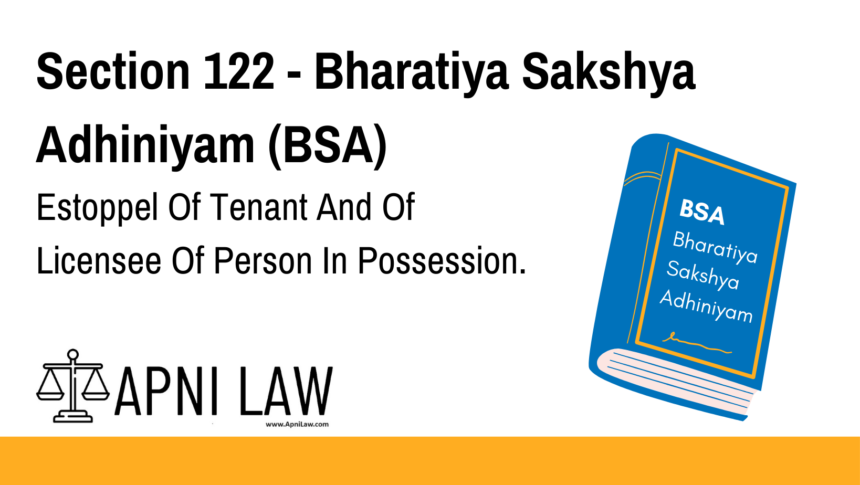Code: Section 122 – Bharatiya Sakshya Adhiniyam (BSA)
No tenant of immovable property, or person claiming through such tenant, shall,
during the continuance of the tenancy or any time thereafter, be permitted to deny that the
landlord of such tenant had, at the beginning of the tenancy, a title to such immovable
property; and no person who came upon any immovable property by the licence of the
person in possession thereof shall be permitted to deny that such person had a title to such
possession at the time when such licence was given.
—
Explanation of Section 122 – Bharatiya Sakshya Adhiniyam (BSA)
Section 122 of the Bharatiya Sakshya Adhiniyam codifies a specific rule of estoppel applicable to tenants and licensees of immovable property. The provision prevents two categories of persons from challenging the title of the person through whom they derive their right to occupy the property:
- A tenant cannot deny the title of the landlord at the beginning of the tenancy.
- A licensee cannot deny the title of the person who granted them license to enter or use the property.
The section ensures consistency and honesty in legal relationships. Once someone acknowledges another person’s title—either as a landlord or licensor—they are legally barred from disputing that acknowledgment later.
Key Points:
- The estoppel applies during the tenancy and even after it ends.
- It applies to the tenant and anyone claiming through the tenant (e.g., sub-tenants).
- It applies to licensees—persons who occupy property with permission but not legal possession.
- It reinforces the principle that one cannot accept benefits under a contract or arrangement and later challenge the basis of that arrangement.
—
Illustration
Example 1: Tenant Denying Landlord’s Title
A rents a house from B. After three years, A stops paying rent and claims that B was never the true owner. Under Section 122, A is estopped from denying B’s title at the start of the tenancy, regardless of what later disputes may arise.
Example 2: Licensee Disputing Possession
X permits Y to set up a food stall in a portion of X’s land. Later, Y claims X has no right over the land. Section 122 prevents Y from disputing X’s right to possession at the time the license was granted.
—
Common Questions and Answers on Section 122 – Bharatiya Sakshya Adhiniyam (BSA)
1. Can a tenant ever challenge the landlord’s title?
Yes, but not while estoppel applies. A tenant cannot deny the landlord’s title at the time the tenancy began. However, the tenant may challenge ownership in limited cases—like if the title is transferred to someone else or after the tenancy ends under specific legal grounds.
2. Does this apply after the tenancy ends?
Yes. Section 122 explicitly states that this estoppel continues even after the tenancy ends.
3. What is the difference between a tenant and a licensee?
- A tenant has legal possession and usually pays rent for immovable property.
- A licensee only has permission to use the property without legal possession or tenancy rights.
4. Can a sub-tenant deny the landlord’s title?
No. A sub-tenant derives their right from the original tenant and is also bound by the same estoppel under Section 122.
5. Why is this section important?
It ensures trust and certainty in property relationships. Without such a provision, tenants or licensees could unfairly challenge the person from whom they derived their rights.
—
Conclusion
Section 122 of the Bharatiya Sakshya Adhiniyam provides clarity and legal stability in landlord-tenant and licensor-licensee relationships. By preventing tenants and licensees from disputing the very title they once accepted, this section upholds honesty and prevents misuse of possession. It reinforces the fairness expected in legal agreements involving immovable property.
For more simplified legal interpretations and updates on Indian law, visit ApniLaw.












